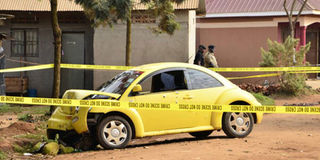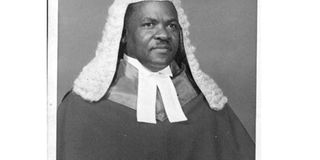The history of political murders in Uganda

Restricted access. Police cordon off the scene of crime where Arua Municipality Member of Parliament Ibrahim Abiriga was shot dead in Matugga, Wakiso District last Friday. FILE PHOTO
What you need to know:
Incidents. Although political killings were more common in the 1970s, various murders in the country seem to be taking a similar trend today as some government officials and political leaders have in recent times been shot dead in broad daylight. Henry Lubega brings you some of the incidents.
The legal dictionary defines assassination as “Murder committed by a perpetrator without provocation of the victim, who is usually government official.” While the Free dictionary defines it as “to murder a prominent person by surprise attack as for political reasons.”
The term political murder or assassination was first used in the medieval times to describe the murders of prominent Christians by the Hashshanshin, a secret Islamic sect.
In the twenty first century the phrase political murder is used to describe murders committed for political reasons, especially when they are targeting government officials or public political figures. Assassination may be used as a political weapon by a state as well as by an individual; it may be directed at the establishment or used by it.
In the Uganda scenario political murders have been part of the equation right from the early days of independence.
Probably Sir Edward Mutesa II would have been the first political assassination victim had he not escaped from the palace in 1966.
The first recorded political assassination victim in Uganda’s history was the deputy army commander Brigadier Pierino Okoya in 1970.
In the wake of the murder of Arua Municipality MP Ibrahim Abiriga on Friday last week as he neared his home by four men riding on two motorcycles, there has been speculation that his killing could have been political because of his vocal support for the removal of the age limit from the Constitution last December.
Police investigations into the murder have just started so it’s too early to definitely attach a political motive to the killing. Below, we bring you some of the prominent political killings in Uganda’s checkered history.
Benedicto Kiwanuka
Uganda’s first prime minister also met his death at the hands of Amin.
Though the most talked of cause of his death is the release of two American journalists, a chief magistrate in western Uganda at the time believes it was more to do with Kiwanuka’s political ambition than his legal practice that caused his death. Writing in his memoirs, Days of Judgment: A judge in Idi Amin’s Uganda Sir Peter Jermyn Allen says Kiwanuka was a frequent guest in Masaka and parts of Ankole not on judicial duty.
“Rather he seemed to be out and about renewing his political contacts and making new ones evidently with the intention of rebuilding his once very strong political following there…….. Kiwanuka was too much of a politician to be able to let it all go and he was ambitious for power. The word was spreading around that he had made it clear to his close supporters that he was planning to be the next president of Uganda nothing less….. In the circumstance Kiwanuka’s actions appeared to be premature as well as rather dangerous for himself and those around him…..”
Like a number of Amin’s victims his remains to date have never been found and nobody has ever been brought to book for his murder.

The late Ben Kiwanuka
About the late Kiwanuka
A year before he became prime minister in March 1961, Kiwanuka had defeated the colonial government and all those who had been illegally imprisoned were set free by the courts of law. The colonialists had imprisoned thousands of Ugandans, especially Democratic Party supporters in eastern and northern regions, who were calling for independence. His wife Maxencia Zalwango said Kiwanuka received numerous suspicious telephone calls before he was kidnapped.
It was because of his spirit to fight injustice and dictatorship that Kiwanuka ignored threats warning him to stop reprimanding the Amin military government on its heinous activities against its citizens.
Brigadier Pierino Okoya
A few days before his murder, he arrived at his home in Koro village Gulu District from Masaka. On the evening of Sunday January 25, 1970 the day he was killed, Okoya went to the Air Force Officers Mess to get some booze.
Besides the place’s commandant he found other air force officers like Lt Andrew Mukose, Lt Motono, Warrant Officer Kasule and Smuts Guwedeko. He was told the bar man had gone to get more stock.
Later that evening he sent his driver a one Opige and his radio man who was also doubling as his body guard back to the mess to find him some beer leaving his exposed. At the mess, the two were offered some free beers before delivering their boss’s orders. By the time they got home Okoya and his wife were in a pool of blood, dead.
Following his death two separate inquiry teams were set up. The army team was led by Col Obol, others were Lt Wooley Odong, Maj John Mwaka, Maj Oyite Ojok, Maj. Emmanuel Ogwal and Let Lukwiya as its secretary.
The three man police inquiry team was headed by the head of CID Mohamed Hassan, others were Wawuyu and Ocungi.
The two teams pointed to Amin, the army report indicated that he used the Air Force to carry out the murder. Two air force officers Smuts Guwedeko and Kasule, were in April 1970 sent to Luzira.
Following the 1971 coup the two were released and promoted, Guwedeko became a Brigadier and Kasule a major. After the coup all those involved in the investigation of the murder of Brig. Okoya were killed.
Janani Luwum
The former archbishop of the Church of Uganda and two ministers were killed following a forced public rebel activity confession at the Nile Conference centre.
After their arrest they were taken to State Research Bureau offices in Nakasero where they were killed from and their bodies put in a stage managed accident. But they had bullet wounds. No one has ever been brought to book for their murder.
Andrew Lutakome Kayiira
As a former energy minister in the NRM regime he was the first politician to be killed just a few days after his release from jail.
Armed men stormed his friend’s home Henry Gombya in Lukuli Nanganda a Kampala suburb and shot only the former minister.
Kayiira was shot four times in the right arm and twice in the left side of the body.
Two officers from the Scotland Yard police Detective, Chief Superintendent Thompson from the Serious Crime Branch and Detective Sergeant Sanderson a Laboratory Liaison Officer joined the Uganda police in the investigations.
The official investigation report has never been made public, adding it to the number of unsolved political murders in the country.
Byron Kawadwa
He was a playwright of his own class. It was his play Oliymba lwa wankoko (The Cock’s song) which was a political satire. It did not go well with the Amin administration.

Murderd. Byron Kawadwa (in white), a former playwright who was killed during the Amin regime.
How it happened
According to one of the members of Kampala City Players, Sarah K. Birungi, “A few days after our return from Lagos, we met at the Arts Club within the National Theatre to review the trip and the performance. During that meeting someone came and whispered to Kawadwa that someone wanted to see him outside. A few minutes after Kawadwa’s exit from the hall, we heard people outside wailing. When we went out to find out what was happening, we were told that Kawadwa had been put in a car boot and driven away. A few days later, his body was discovered in Namanve, from where it was picked and buried in Kisasi, a Kampala suburb.”
Ibrahim Abiriga
Arua Municipality Member of Parliament Ibrahim Abiriga was last Friday shot dead near his home in Matugga, Wakiso District.
He was reportedly shot by two people who were riding on a boda boda at about 6:30 pm on Friday.
He was travelling in his famous yellow Volkswagen car with his bodyguard who was also shot dead.
He was also among the initiators of the move to amend the constitution to remove article 102b so as to have the 75 year upper age limit for the president removed.
However, his participation in ensuring that the age limit is removed was interrupted by a court case in which he was accused of urinating in public near the Ministry of Finance head offices in Kampala.
Abriga would later be fined Shs40, 000 by Buganda Road court for being a public nuisance.

Gone. Former Arua Municipality MP Ibrahim Abiriga at Parliament recently.
What others say
President Museveni on Sunday said there is high probability that the killing of Arua Municipality Member of Parliament Ibrahim Abiriga “was a political assassination because of his commitment to the NRM”.
Mr Museveni, however, said he cannot rule out “personal motives for the murder”.
Erinayo Oryema
He was the first Ugandan to become Inspector General of Police. As head of police he was instrumental in investigations of the Okoya murder. The police report implicated Amin in the murder.
During the 1971 coup his house was bombed killing his body guards and father-in-law. Having learnt of his escape, Amin demoted him from IGP to a rank of Lt Col and appointed him a minister.
On the morning of February 16, 1977 while attending a function at Nile Conference Centre where ‘rebels’ were to confess, he was arrested . The official government statement was that they tried to overpower their driver.
His body was handed over to the relatives, just like that of his colleague Oboth Ofumbi, for burial save for that of the Archbishop.

Erinayo Oryema
While appearing before the Justice Arthur Oder led-commission of inquiry into human rights violations in the early days of the NRM government, former vice president Mustapha Adrisi said: “He (Amin) showed me the photos of the accident. But this surprised me than convinced me. I never believed him.”
Francis Walugembe
The former Masaka mayor was one of the early victims of Amin’s brutality.
He was killed in September 1972 in Masaka town. Walugembe was arrested by the State Research Bureau agents in broad daylight in Nyendo Town in Masaka and put in a car boot before being driven to Kasijagirwa Military Barracks
Arrests
He was tortured and killed from the barracks quarter guard.
After the fall of Amin in October 1981, Col Abdul Nasur, who was the governor of central province, was convicted of Walugembe’s murder and sentenced to death, after 22 years on death row he got a presidential pardon.




